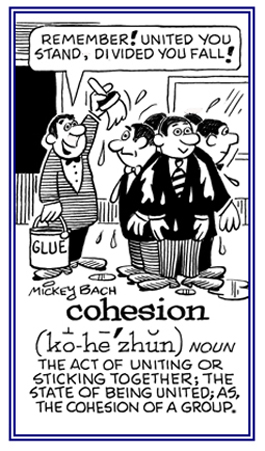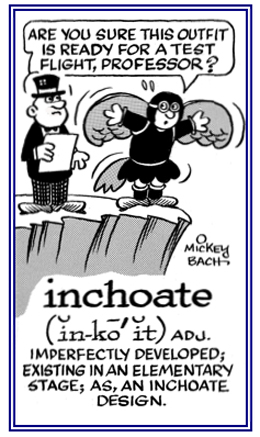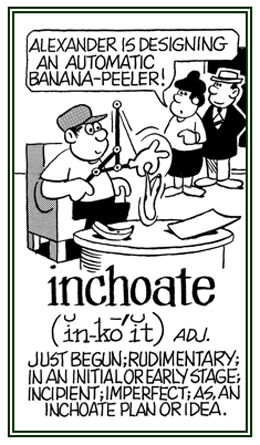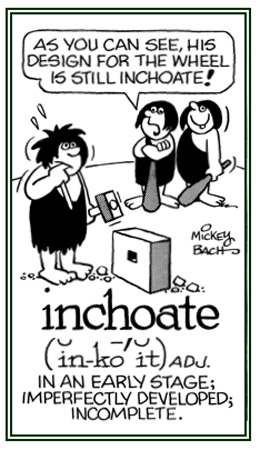her-, hes-
(Latin: stick to, cling to, cleave to)
2. Characterized by being orderly, logical, and consistent: When people coherently think of bringing their thoughts together in a clear and concise way; then this will usually result in something being well organized.
If people want to maintain their cohesion, then they must not let minor differences of opinions interfere with their major objectives.
A written story whose facts all make sense and fit together has cohesion.
2. Particles of the same substance sticking together: Cake batter usually has cohesion because all of the ingredients are mixed together and cannot be separated again!.Tar as a substance has cohesion and so does glue.

Go to this Word A Day Revisited Index
so you can see more of Mickey Bach's cartoons.
2. In physics, the intermolecular attraction by which the elements of a body are held together.
2. An involuntary delay or an inability in starting something.
2. To be reluctant to do, or to say, something.
3. Etymologically, to hesitate means "to become stuck".
It comes from Latin haesitare, a derivative of haerere, "to hold fast, to stick".
The basic idea of hesitate refers to being "held back", or in speech of "stammering", and so of being unable to act or speak promptly or decisively.
2. Anyone who holds back because of doubt or indecision.
2. The state of being reluctant or undecided.
3. A pause, or faltering, in speech which may lead to stammering.
4. Etymology: from Latin hæsitationem, hæsitatio, "irresolution, uncertainty"; from hæsitare, "to stick fast, to stammer in speech, to be undecided"; a recurring action of hærere, "to stick, to cling".
2. Regarding something which is only partly or imperfectly formed or developed; partly in existence: Sally had to write a term paper and she had an inchoate outline, which she showed to her teacher first, before beginning to think about it seriously and expanding on it.
3. Concerning something which lacks structure, order, or organization: During the writing process of an inchoate character in a novel, the narrative flounders, or breaks down.
4. Etymology: from Latin inchoatus, inchoare, alteration of incohare, "to begin"; originally "to hitch up".
Inchoate is believed to have been borrowed directly from Late Latin inchoationem, nominative inchoatio, from Latin inchoare, and incorrectly altered from incohare, "to begin, to start out".
It originally referred to "hitch up" (a wagon or plough); from in-, "on" + cohum, "strap by which a shaft or plough was fastened to the oxen's yoke".





